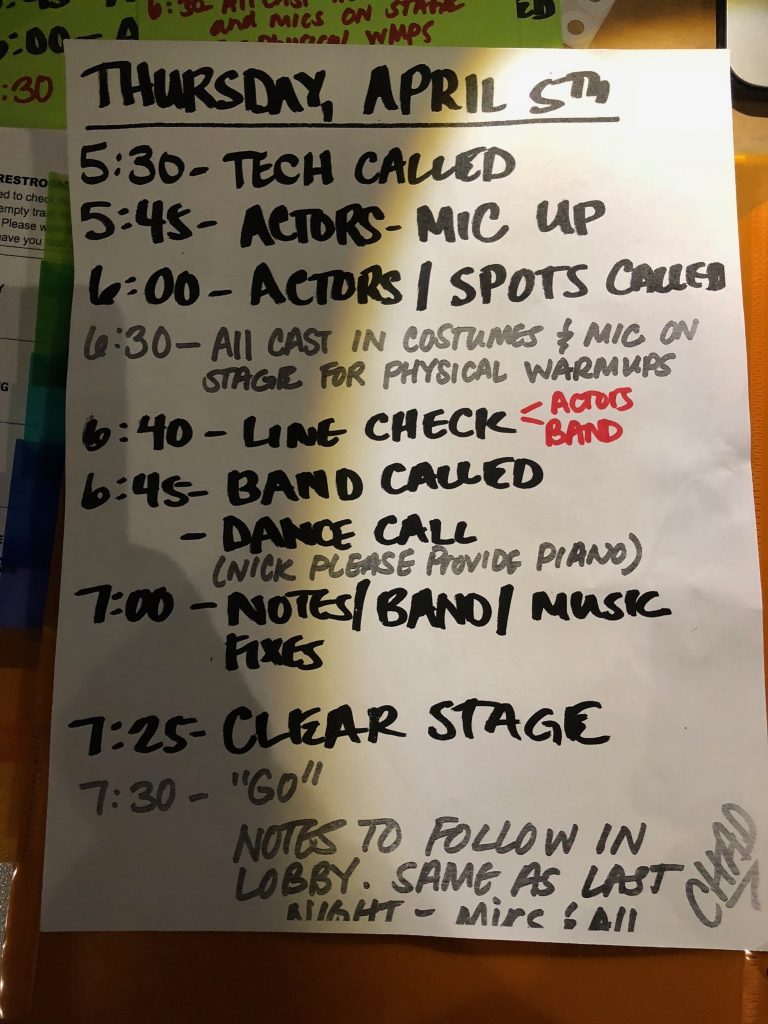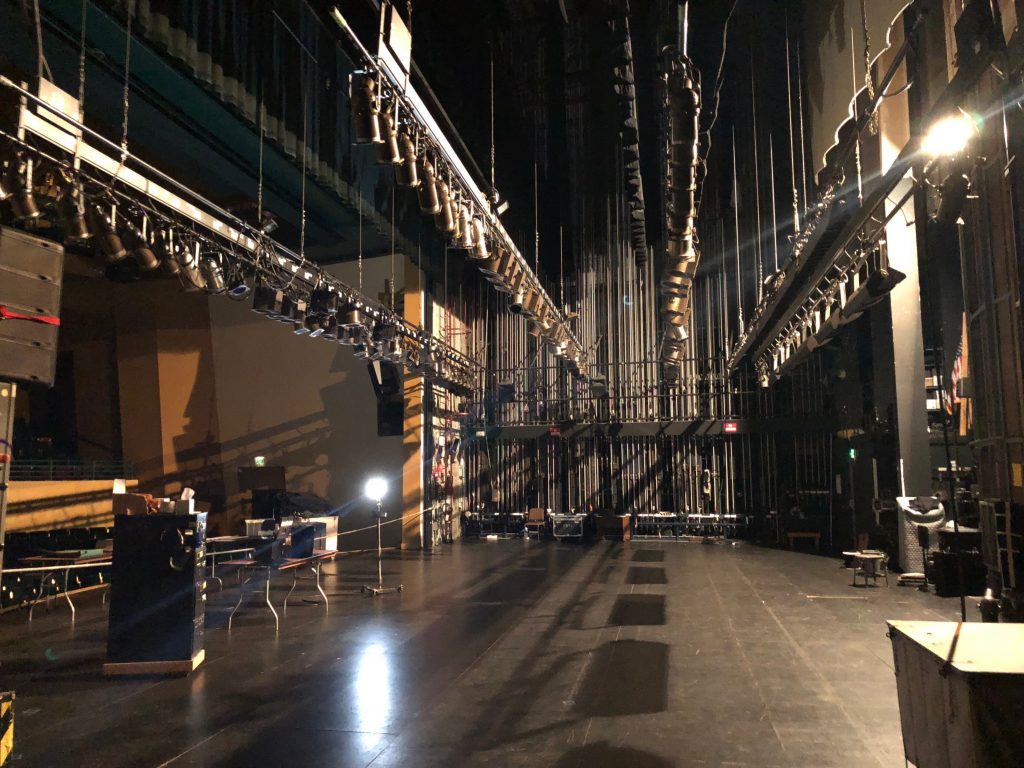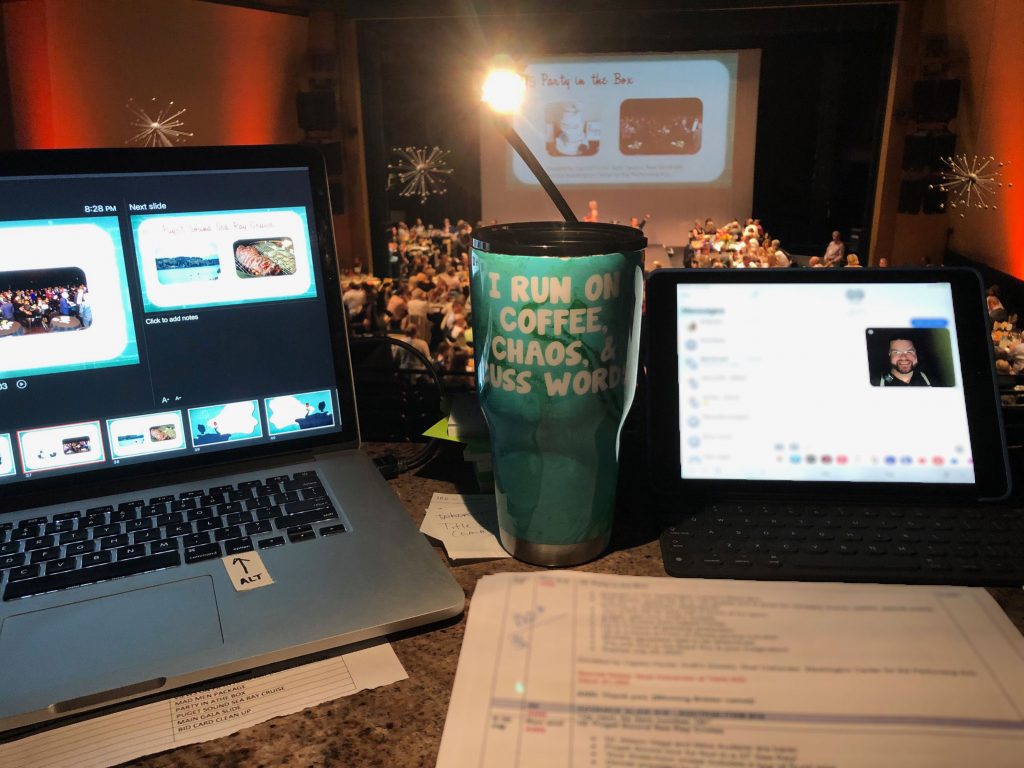By Alec Clayton
A woman holding a clipboard sticks her head into a dressing room and says to the actors, furiously getting into costume and makeup, a single word: “Five.” The actors say back to her, “Thank you, Five.”
Five minutes later the platform in front of stadium seats at Harlequin Productions becomes the front porch of a house in a little town in Georgia in the 1930s and actors Aaron Lamb and Helen Harvester become Atticus Finch and Mayella Ewell in “To Kill a Mockingbird.” Or the stage area at Olympia Little Theatre is transformed into a wild river in pioneer America, and women actors Jesse Morrow and Heather Christopher become adventurous men John Wesley Powell and John Colton Sumner in the play “Men in Boats.”
This is the magic of theater, and the woman holding the clipboard and saying “five” is one of the most important magicians making it happen — she’s the stage manager, or SM. Very few people in the audience know just what it is stage mangers do.
“Stage management is simultaneously one of the most important jobs in entertainment and one of the least understood,” says actor and director Christian Carvajal. “A great stage manager has the skills of an actor, director, lighting designer, sound designer, personal assistant and dramaturg. They’re both good cop and bad cop.”
Stage manager Melissa Harris recalls, “I remember numerous post-show meet-and-greets where people asked ‘Were you in the show?’ I’d say, ‘Yes, I’m the stage manager,’ and smile as their blank faces stared back at me. They had no idea what that meant or what it involved.”

Actor and director Kate Ayers says SM’s are “the glue that holds it all together. A good stage manager can make or break a production.”
So what exactly is it that the SM does? Well, practically everything. They organize auditions, take care of contact- and sign-in sheets, oversee the rehearsal calendar, review rehearsal reports and serve as a main point of contact for everyone involved in a show. The SM coordinates all communication among director, cast and production staff, and schedules rehearsals. They are responsible for helping actors get off book and remember their blocking, and they coordinate all production meetings.
“A good stage manager is always engaged, watching and listening closely at every rehearsal,” says Christopher. “They keep detailed blocking notes and know where each actor should be on the stage at any given time.” Christopher explains how the SM is “on book,” meaning they will remind actors of their lines when called, and take notes on lines that were missed. The SM is given the show by the director after opening, and it is the SM’s duty to oversee actor cues, rectify technical issues and generally ensure that the show does, indeed, go on.
Harris stage has managed “The Elephant Man” and “The Rocky Horror Picture Show” at Harlequin Productions, “Angels in America” at Lakewood Playhouse and “3 Impossible Questions and “The Miraculous Journey of Edward Tulane” at Olympia Family Theater in her career.

“Theater goers have absolutely no idea who the stage manager is or how important her job is to the production,” Harris explains. “A good stage manager knows that they must do everything in their power in order to let the director direct, the actors act, the designers design, and the techies tech. Make way, then get out of the way. They must be infinitely patient, a problem solver, an effective communicator, a psychologist, and above all they must be enamored with the entire theatrical process.”
Kris Mann has been stage managing since 1997, frequently for Olympia Family Theater and Theater Artists Olympia. She says, “It’s really a Jack/Jane of all trades job. I would say the most important jobs for the SM are communication and safety.”
“I’ve had the honor of working with several of the best stage managers in this region,” muses Carvajal. “When Nena Curley or Kris Mann, to name two, welcome company members to auditions, knowledgeable actors relax because they know the project is in professional hands. The SM is the first one in the door, last to leave and the hardest working person in between. Then the only applause they ever get is from the company.”
When we once again pack familiar — and possibly new — performance halls, let’s remember to give special applause to each production’s unwavering conductor, the stage manager.


